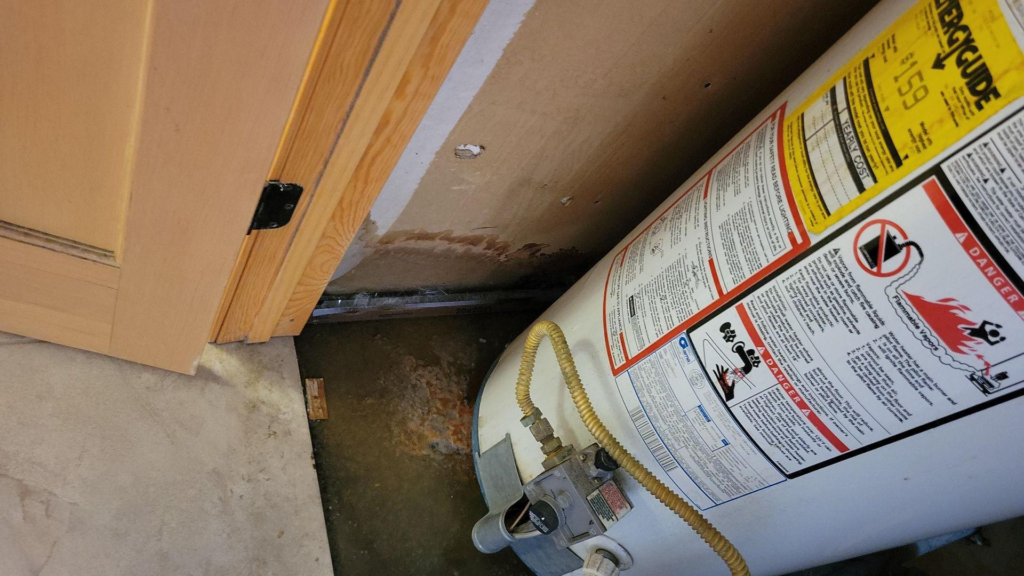
Water Heater Leaks
Water Heater Leaks
Help for Water Heater Leaks
Water heaters are wonders of physics. Whether electric or gas, they work essentially the same. They bring cold water in through the dip tube and heat it using the electric heating element or gas burner. The hot water rises in the tank and is moved throughout the home or business through the heat-out pipe. A malfunction during any part of the process can cause a problem such as a leak. Even a small leak can cause a great deal of property damage. The longer the problem goes unnoticed, the more severe the water and mold damage is to drywall, ceilings, and walls. When you notice a leak, the first think to do is diagnose where the leak is coming from. Key points for trouble shooting leaks are listed below.
- Check the drain valve: You may notice a leak on the base of the water heater. Sometimes the valve loosens and needs tightening. If it is leaking from the base of the valve itself, it may be time to replace it.
- Inspect the tank: It is recommended to drain and clean the tank twice a year. However, many of us do not and as a result sediment can build up and cause the tank to crack and corrode the bottom of the tank. Here you may see more of a puddle and less of a leak. At this point you will need to invest in an entirely new water heater.
- Check the supply lines: Fitted to the top of the tank, there are two water pipes: a cold-water supply pipe and a hot water discharge pipe. The water is controlled by a shutoff valve. Notice if there is any leakage from the pipes and around the valves. If anything is loose, tighten it, if it is worn it will need to be replaced.
- Check inlet and outlet connections: Eventually these can loosen and leak. Follow the pipes noticing any moisture and making sure all fittings are tight. Some of these simply require a little bit of tightening or updating.
- Check the temperature and pressure relief valve: The T/P valves’ important job is to regulate pressure inside the tank. Over time the valve loosens and needs to be tightened. If it is old, it may leak even when your tank pressure is normal and may need to be replaced.
- Check the temperature setting: Hot water causes steam. If the temperature is set too high the steam inside the tank has nowhere to go and will look for cracks to escape. When it does it can cause a leak.
- Anode rod: What is an anode rod? Does a water heater need one? An anode rod is a long metal rod that extends through the interior of the tank. Its important mission is to attract corrosive particles that are in the water inside the tank. Not all water heaters have one, but if yours does it will need replacement every 3-5 years to remain functional. They are referred to as sacrificial rods which means they are designed to deteriorate. Once it does, leaks occur where the anode used to be. No one wants that. It is easy to see why this is an important maintenance task.
- Equipment failure: The life span of a water heater is around 10 years. All equipment needs proper maintenance and eventual replacement. Below are some signs that will help you recognize when your water heater is near to failing.
- Water is not as hot as it used to.
- Rusty water coming from your faucets or on your clothes.
- Cracking and popping sounds from water heater.
- Metallic taste in your hot water.
- Rust forming on the outside bottom of your water heater.
- A puddle under your water heater.
- Clogged or rusty burner units on your gas water heater.
Found a leak? Call Water Extraction Experts!
We depend on our water heaters daily. We tend to take them for granted until there is a problem. It is vital to take steps to help reduce the risk of mold and water damage. The sooner a leak is discovered, the less chance of a flood. If the unforeseeable does happen, act and call Water Extraction Experts immediately. A team of certified water damage technicians can minimize damage and treat the areas to prevent mold growth. We are here to help you 24/7. Water Extraction Experts specializes in water damage restoration, sewage cleanup, mold removal and flood damage cleanup.
EMERGENCY 24/7 WATER DAMAGE
CALL: 505-250-6500
